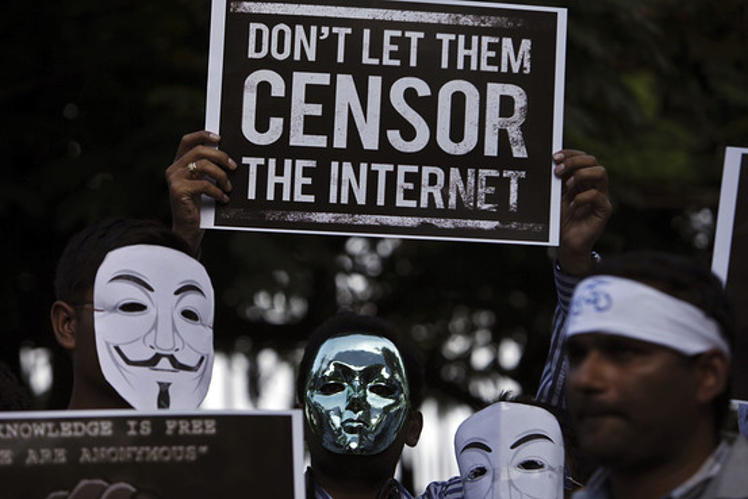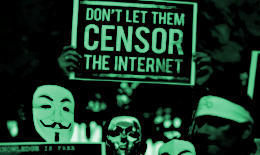When Media Minister Gayantha Karunathilake assumed duties as the Minister of Media on the 16th of January, his first act was to extend an open invitation to journalists who fled into exile, assuring them of their safety and the end of the white van culture. While extending this invitation he said that no country has 100% media freedom, not even those that cherish the ideals of democracy.
That’s probably one of the most honest things ever said by a politician.
Government censorship is something that’s rarely talked about, yet it happens on a daily basis and it happens globally. Each government has its own unique picture on censoring content. And the part about censoring the independent internet can be either mildly complex or aggressively deadly.
The above map is from the Freedom of the Net 2014 report. It shows internet freedom across the 65 countries. Those countries in blue have little if any freedom, yellow ones are partly free like Sri Lanka and green represents freedom. Looking at it one could say that when it comes to censorship, the English-speaking governments are the ideals.
But this is misleading. Let’s see why the Minister’s statement holds true.
Where Sri Lanka Stands Today
Now before we take a look at other countries let’s take a look at our own.
According to the results in the Freedom on the Net 2014 report by Freedom House on Sri Lanka, we are partly free on the internet. (For those of you who are lost: Freedom House is a non-profit dedicated to ensuring everyone has freedom. Each year it publishes a report on internet freedom in 65 countries titled Freedom on the Net).
Returning to Sri Lanka’s results: while hate speech was running rampant across our local interwebs, no action was taken to censor it – unlike political criticism. Even so, political criticism was censored based on the source, and not on the subject.
“Censorship reflects a society’s lack of confidence in itself.”
– Potter Stewart
Not that any form of internet censorship the government undertook was effective. Take the case of Colombo Telegraph; not only was its censorship ineffective (all you needed to do was use Google DNS) but the ban helped the site become more popular than ever before. Offline censorship, on the other hand, was extremely effective that a certain sect of politics practically became taboo.
However, that was 2014; it’s 2015 now. One of the new government’s first acts to unblock practically all censored news site,s such as Colombo Telegraph. The porn sites, which were the original ones to hit the block list, still remain on it.
This paints a shocking new picture: the government actually giving media freedom and being responsible with censorship. Ineffective censorship it maybe, but responsible it is. For now, anyway, only time will tell if it stays this way, but right now we can be reasonably hopeful that Sri Lanka’s entry in the 2015 Freedom on the Net report will look better than 2014.
The brutal East
Looking at the map above, the picture of censorship in the east isn’t a pretty one. There’s a lot of censorship both online involving direct blocking and offline with threats. Exactly how much and how deadly varies from country to country.
Take our neighbor India. Now India blocks websites it doesn’t like. In fact, they started off this year by blocking 32 websites for “Jihadist propaganda”. The list included a few popular sites such as GitHub and Vimeo. Needless to say, the move sparked a lot of outrage which was visible on social media. The Indian government listened and reviewed the case, reversing the ban on some of the sites.

In another interesting case from India, 2 women were arrested, one for making a Facebook post criticizing a shutdown of Mumbai and the other for liking it. The women were later released with the charges dropped.
Such cases violating internet user rights aren’t rare in India. The lawmakers seem to have rather arbitrary minds, and while cases can be resolved, India is firmly on the path to more censorship as opposed to less, as outlined here.
Now let’s take a look at Singapore. The Singaporean government has an interesting way of censoring online content. It doesn’t block it. Online news providers can be issued with takedown orders and if they don’t comply within 48 hours they have to pay SGD$5000. Bloggers don’t have this restriction, but apparently, they still live in fear.
“Censorship is never over for those who have experienced it. It is a brand on the imagination that affects the individual who has suffered it, forever.”
Noam Chomsky
Take the case of Roy Ngerng, who wrote a critical blog post about how the CPF (Singapore’s version of EPF) was being misappropriated. The next thing he knew; he was fired from his job and was personally getting sued by the Singaporean Prime Minister for defamation. It was a historic moment for Singapore’s internet censorship – one that highlights a uniquely legal method of strong-arming media into an approximation of being censored.
Singapore isn’t all. Indonesia apparently keeps a strangely omnipotent eye on social media, as displayed when a travel blogger, Derek Freal of the Holidaze.com, was arrested and deported for a single tweet.
Then there’s China with it’s Great Wall. We’ve covered it before and how it literally blocks every website the rest of the world visits on a daily basis.
Shockingly, the Chinese government has 2 million keyboard soldiers patrolling the wall. To put that into perspective, China has the largest active military in the world, consisting of approximately 2 million soldiers. It needs as many keyboard warriors as it does actual soldiers to censor the internet.
After all,16 year olds who can get 500 re-tweets are deadly threats to social harmony.
“The restrictions and censorship in Iran are a bit like the British weather: one day it’s sunny, the next day it’s raining. You just have to hope you walk out into the sunshine.”
Asghar Farhadi
Let’s not forget the brutal Middle East. In Afghanistan, journalists have to censor themselves fearing attacks from the Taliban AND corrupt government officials. In Saudi Arabia, not only is it criminal to discuss atheism online but as the case of Raif Badawi shows, anyone talking about free speech can expect a prison sentence of 10 years along with cruel medieval punishment. In Bahrain, not only are those who disagree with the government get attacked, their online lives are also invaded by NSA-grade malware.
The Middle East is definitely not a safe place to voice your opinions if they differ from the government.
The democratic West

According to the map from the report, the grass seems to be a lot greener in the West. After all, it should be considering how it champions freedom and liberty all time. However, are all the countries in the West actually responsible with their censorship?
Let’s start off by looking at the United Kingdom. The UK blocks websites, however the difference is that these websites are file sharing sites that violate copyright laws. Unlike Sri Lanka the UK actually enforces its copyright laws. There’s also the Internet Watch Foundation (IWF) which acts as an independent body working with British ISP’s and Police to blocks access to child pornography. So while the UK does block online content, it’s actually legal and ethical when it does it. However, an offensive tweet can still get you arrested.
Then there’s the good old USA. The land of free seems to actually live up to it’s name by following the example set by the UK. Both the Freedom of the Net 2014 report and the OpenNet initiative give the US a good rating.
However, US censorship is not carried out by brute blocks, but by far more sophisticated methods. When it comes to spying on internet users, the US government is second to none thanks to NSA. We could write about that, but it would take one if not two new articles. When it comes to hiding data, the US prefers the weapons of legality. Each state has their own (sometimes different) perspective, and perhaps the best way to illustrate this censorship is to examine the now-infamous pursuit of creationism.
“There’s been an incredible censorship in America and throughout the world, but particularly in America where students aren’t even allowed to critically think about evolution, the issue of origins; they are not allowed to hear other points of view; they are taught incorrectly about science and taught that evolution is fact.”
– Ken Ham
The US works online, not by blocking the data seen by the public, but as a fragmented entity that directs from offline what is put on the Internet. Suffice it to say that Uncle Sam is nowhere near as benevolent as it seems.
Looking at Brazil however, things start to get interesting. In Brazil, the Federal Constitution protects everyone’s right to free speech but it forbids anonymity. So the Brazilian government keeps it’s internet free (yup they actually follow their constitution).
Recently the Brazilian government went further in protect internet freedom and passed a new law that protected the rights of internet users, ensured net neutrality among other things. However, when you look at Brazil’s record. you see that it sends a lot requests to Google to remove content. While not censorship on the user end, it’s effectively data tampering on a higher, legal process.
All that is gold does not glitter
Now we got curious and looked at Google’s transparency report. In case you’ve never heard of it before, a Google transparency report shows how many requests Google got within a time period to take down content from government agencies, organizations, individuals and how many times it complied. We downloaded the latest report, which contains data from 2013.
In December 2013, Google had received a whopping 3,105 requests to take down content from governments across the globe. So which governments call Google the most to take down content? According to the transparency report here’s the top 10:
- Turkey
- United States
- Brazil
- Russia
- Germany
- India
- United Kingdom
- France
- Spain
- Italy
Only 3 of those countries (Turkey, Russia and India) actively censor their internet. The other 7 Western countries on this list follow the pattern of the UK, US and Brazil: championing free internet and free speech for everyone. Here’s a list of what these and other governments ask Google to remove. According to Google, 38% of these requests cited Defamation as the reason and 35% cited other (such as copyright violation) as the reason. No matter the reason, as Susan Infantino, Legal Director at Google, points out, a lot these requests from governments is to remove political content that’s critical of them.
This isn’t direct censorship. It’s still up to Google to decide whether to actually remove the content in question.
Turkey, for example, it sent 895 requests but Google only complied with 17% of them. On the other hand, the US had sent 481 requests and Google complied with 46% of these requests. It’s not a guaranteed method of censoring content; however when it works it is devastatingly effective, mostly because so few end users are even aware this of this happening. This is especially true for western governments because the process provides a legal avenue for them.
So where do we stand?
In the East, the tradition is to actively block content that a user wants (and perhaps to send a couple of very tough men after you). If you’re standing in the West, then you can view and create whatever content is on Google, but this is very much subject to change because the government asked nicely.
![]()
By all accounts, our (Sri Lankan) Internet censorship is mild compared to China’s Great Firewall or to the West’s what-they-know-can’t-hurt-’em approach. This may be due to the lower sophistication of the censorship techniques used. However, at the end of the day, Minister Gayantha Karunathilake’s words remain true: there is no such thing as 100% media freedom anywhere on this planet of ours.*
This also brings to light the question: in censorship necessary? Katie Adie once famously said that “When you are covering a life-or-death struggle, as British reporters were in 1940, it is legitimate and right to go along with military censorship, and in fact in situations like that there wouldn’t be any press without the censorship.” Indeed, we’ve seen Internet societies without censorship: they turn into the likes of 4chan and 8chan, societies which lay bare the true depravity of the human soul.
“I have a very serious censorship office inside my head; it censors things that I could tell you that you would never forget, and I don’t want to be the person to stick that in your brain.”
Alan Furst
Perhaps, as Timothy Smothers once said, the only valid censorship of ideas is the right of people not to listen. Is this something we want to see? And who decides? Who draws the line?
Food for thought.
*Except maybe in Iceland.







GIPHY App Key not set. Please check settings